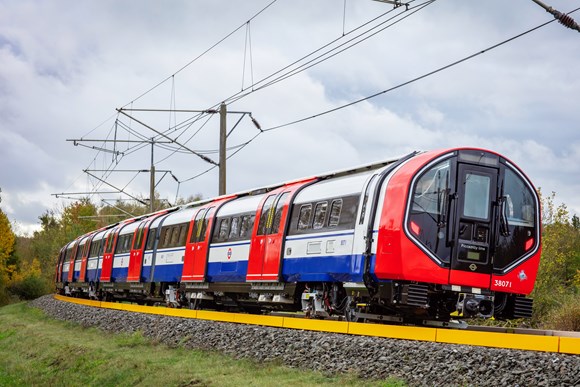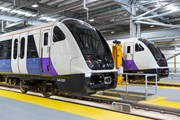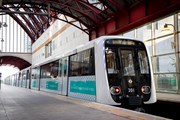
Friday 22 Dec 2023
TfL will manage to deliver a full programme of improvements for 2024/25 as set out in its draft Business Plan

PN-156
Transport for London (TfL) has today confirmed that it will deliver the full programme of improvements and vital infrastructure renewals for London in 2024/25 as set out in its recently published Draft Business Plan.
Within its Business Plan, TfL has set out how, following a programme of work to rebuild ridership, increase income and reduce costs, it is now on track to be financially sustainable in terms of its day-to-day operations. TfL has always been clear that it could fund around 75 per cent of its vital capital investment programme for the next year (2024/25) – but required government support for capital investment across its business plan. Alongside London’s business groups and other stakeholders, TfL has been making the case to Government that a proportion of Government capital investment is necessary in order to fund the remainder of the plan. Government funding is a feature of every major transport authority around the world and investment in transport within London benefits the whole of the UK through TfL’s extensive supply chain that supports 100,000 jobs around the country outside of the capital.
The draft Plan was originally published on 11 December but, given uncertainty over Government capital investment at that time, the TfL Board was not asked to formally agree it on 13 December. On Monday 18 December, the Government confirmed that it will provide £250m of capital investment for TfL over the next year. Because the Government has only provided half of the figure that TfL needs, TfL has had to take difficult decisions that have longer-term potential financial impacts, but allow the improvements and renewals to proceed. TfL has been working hard to assess the options and has implemented a number of measures that mean TfL is now able to start delivering the plan. The business plan was therefore agreed by TfL’s Finance Committee via delegated authority today.
These measures undertaken by TfL to balance the plan include rephasing the timing of payments under the contract with Siemens Mobility, who are delivering the new Piccadilly line trains that are currently under construction.
While recovering ridership and other factors will mean that TfL is predicted to have a greater surplus and better access to any new borrowing needed in future years, it is now finalising plans with Siemens Mobility to rephase some payments under the contract. This rephasing does not affect the delivery of the first train in 2024 for testing in London ahead of entering service in 2025, and will also protect the planned Piccadilly line timetable uplift in 2027 – meaning that Londoners will still benefit from the new, higher capacity walk-through trains.
These arrangements will also mean that more new trains will be built in the Siemens Mobility factory in Goole Yorkshire, compared to the 50 per cent originally planned, where Siemens is investing up to £200m and creating up to 700 jobs directly at the factory and up to 1,700 in the supply chain. Subject to long-term certainty on Government funding, the factory in Goole is also expected deliver a replacement fleet on the Bakerloo line, which at more than 50 years old is the oldest in passenger service in the UK, in the future. Producing more Piccadilly line trains at Goole, which are 20 per cent more energy efficient than the current fleet, will support this by supporting local supply chains and training the next generation of engineers.
While these amends mean that TfL can deliver its planned improvements for 2024/25, TfL’s Business Plan continues to assume that 50 per cent of funding for TfL’s major capital investment programmes, such as for rolling stock and signalling projects, from 2025/26 onwards is provided by the Government.
With there now being certainty over the capital support from Government in 2024/25, a new arrangement with Siemens Mobility, and with ridership returning to 90 per cent of pre-pandemic levels, TfL can now move forward with the improvements set out within the plan. The plan, which runs until the end of financial year 2026/27, sets out the next stage of TfL’s vision of being a strong, green heartbeat for London. It shows how TfL will be able to deliver a range of vital improvements to London’s public transport network as well as unlock new jobs and growth across London and the UK.
TfL’s Business Plan will improve Londoners’ public transport experience by:
- Continuing to deliver existing major projects, including completing the Four Lines Modernisation programme, which will provide new capacity through improved signalling. The business plan will also see both new walk through, air-conditioned trains delivered as part of the Piccadilly line upgrade, and DLR trains, the latter, which will help unlock 10,000 new homes in East London, and start the procurement for new trams to replace the existing fleet in south London, which have been in service for almost a quarter of a century. Procurement to allow for infrastructure works including new stabling for the future Bakerloo line trains is also expected to start in 2024/25, ahead of their potential procurement from Siemens Mobility in the coming years. The Silvertown Tunnel will also be completed, which will relieve pressure at Blackwall and create new cross-river public transport links when it opens in 2025.
- Delivering the Bus Action Plan, which will support 25km of new bus lanes and include the rollout of the new game-changing Superloop bus service - the new network of orbital express bus routes connecting outer London. Across the Business Plan, TfL will also be progressing towards an entirely decarbonised bus network as well as aiming for an overall increase of four per cent in outer London scheduled bus kilometres - offering more alternative sustainable options to key amenities such as shopping centres and hospitals.
- Increasing investment in its Londonwide asset renewals programme, which will help improve the quality and reliability of TfL’s services, as well as deliver against a wider set of outcomes such as decarbonisation, Vision Zero and climate-change adaptation. TfL plans to invest £150m per annum of which half will be allocated to the London boroughs, growing by inflation from 2025/26, into safe and active travel schemes. As part of its Vision Zero commitment to eradicate death and serious injury from London’s roads, TfL will implement safer speeds across London and will also retrofit 1,800 more buses with intelligent speed assistance.
- Working to deliver a number of regenerative schemes through third-party funding and TfL’s Sustainable Housing and Accessibility fund – such as delivering new step-free stations, transforming Elephant and Castle Tube station, and a contribution towards further feasibility studies on the DLR extension to Thamesmead, supporting the delivery of thousands of new homes.
Places for London – TfL’s financially independent property company - will also continue to deliver a range of schemes across London and has identified capacity for 20,000 new homes with a focus on affordable housing, including at Wembley, Kidbrooke and Barkingside. It will also continue to invest in its existing workspaces, shops and arches, making them greener, safer and more accessible to help businesses go further, as well as deliver number of sites for electric charging hubs. These not only support London’s economic growth but also provide vital and sustainable revenue to reinvest into public transport.
Mayor of London Sadiq Khan said: “These past few years have been the most challenging in TfL’s history, but following a programme of work to rebuild ridership, increase income and reduce costs, I’m pleased that TfL is now on track to be financially sustainable for the first time in its history in terms of its day-to-day operations.
“As the Government has only provided half of the capital funding that TfL needs, TfL has had to make difficult decisions about their business plan to ensure they can continue to make vital upgrades to London’s transport network.
That’s why it is still vitally important that we agree a sustainable long-term funding settlement from the Government that allows us to plan and invest for the infrastructure London will need over the coming decades. Expanding our transport network and supporting jobs and economic growth in London has real and sizeable benefits for the economy of the whole UK.”
Andy Lord, London’s Transport Commissioner, said: “Through a huge effort to reduce costs and rebuild our ridership and revenue following the pandemic, TfL is now on track to be financially sustainable in terms of our day-to-day operations. We are also able to cover the cost of the majority of our capital investment.
“Following the confirmation of £250m in Government support for our capital investment programme, we have had to make difficult decisions about our business plan to ensure we can continue to deliver our vital programme of improvements. In order to achieve this, we are now finalising plans to rephase the timing of payments under the contract with Siemens Mobility, who are delivering the new walk-through and more energy efficient Piccadilly line trains that are currently under construction. This rephasing is not something we would have chosen to do, but we have ensured that it does not impact when the first new train will arrive in London for testing, nor the planned timetable uplift in 2027.
“While we can now deliver our full Business Plan for 2024/25, our shortfall in Government capital investment has only been mitigated in the near term and will reduce the amount of valuable investment we can make in future years, unless further funding is agreed. We, alongside London's business stakeholders and others, will continue to make the case that ongoing Government support for capital investment in transport is needed if we are to be able to continue to deliver vital improvements to London's transport network, unlock new homes and support growth across London and the UK.”
The approved Business Plan is available to view here - https://tfl.gov.uk/corporate/publications-and-reports/business-plan
Contact Information
TfL Press Office
Transport for London
0343 222 4141
pressoffice@tfl.gov.uk








